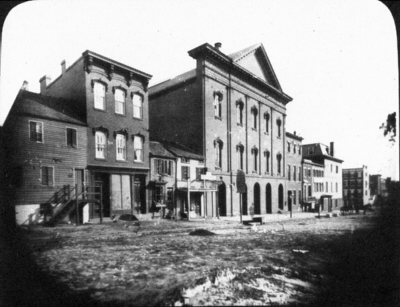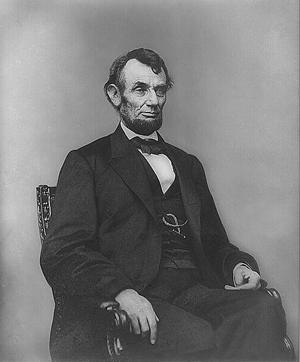|
|
Eyewitness
by
Maggie Van Ostrand |
|
Texas.
Most of the time, that's the only word we need hear to envision an
endless land peppered with outlaws, beautiful women and heroic derring
do. England had knights, Texas has them,
too. We call them cowboys.
The many personalities
in Texas's past can keep writers busy all day every day chronicling
its colorful history. But what about the little guy, the everyman,
the fella next door who never robbed a bank, drilled for oil, or drove
cattle? More than anywhere else, I'd venture to say that, in Texas,
everyone has a story. Take, for instance, J.W. Epperson, born about
1854, died about 1929.
Mr. Epperson, a carpenter by trade, lived at 1601 First Street in
Brownwood Texas,
though he wasn't always a carpenter and he didn't always live in Brownwood.
He was once a newsboy and lived in Washington DC. This does not sound
all that memorable except for one fact: He was selling newspapers
at Ford's Theatre on the night of April 14, 1865. |
 |
On
that tragic night, three newsboys, called "newsies," had posted themselves
near the entrance of the theatre to sell their evening papers to the
great and mighty of Washington society entering Ford's. The newsies
had a very good night. Two of them had sold all their papers and the
third, Epperson, had only one left, when a tall, lanky man in a stovepipe
hat and long black coat stopped to buy it, smiling at the newsboy.
It was none other than Abraham Lincoln. Secretary of War, Edwin M.
Stanton, wanted a newspaper, too, and was "slightly annoyed" because
there wasn't a copy left for him. The President and his wife, Mary
Todd Lincoln, who wore a black and white striped silk dress with black
lace veiling over her hair, were accompanied by a young couple, Major
Henry Rathbone and Miss Clara Harris. They were late; the British
comedy, "Our American Cousin" had already begun.
Mr. Lincoln was no stranger to Epperson, for he had first seen the
gangling figure of the future chief executive several years previously
in Illinois. Mr. Lincoln spoke to a few countrymen at a little crossroads
store, and among his listeners was little Epperson. |
 |
President
Lincoln
Photo courtesy Library of Congress |
As
Epperson and the other newsboys, McClelland and Dougherty, stood staring
after President Lincoln, they decided to buy tickets themselves in
hopes of getting another glimpse of the President. For the price of
a balcony ticket, they got a lot more. The little newsies became eyewitnesses
to one of the most grievous events in the history of the United States.
As the
play progressed, the First Lady sat very close to her husband, her
hand in his. She whispered to him, "What will Miss Harris think of
my hanging on to you so?" The president replied, "She won't think
anything about it." Those are the last recorded words of Abraham Lincoln.
"There's that crazy fellow," whispered one of the newsies as he spied
John Wilkes Booth. Booth himself had purchased a paper from Epperson
earlier that night. Epperson usually sold papers to Booth and other
actors regularly. |
John
Wilkes Booth
Photo courtesy Library of Congress |
At
the loud report of a shot fired, the eyes of the boys, and everyone
in the audience, turned to look up at the President's box. They saw
Secretary of State Stewart struggling with Booth, saw the "demented
actor" thrown into the lap of a woman, pick himself up, jump to the
stage, and hurry through the back of the theatre, limping on his injured
leg. Epperson left the balcony and "squirmed his way to the scene
of the excitement." Many years later, Epperson recollected the horrific
event to the Brownwood News.
When the fatally wounded president was carried out of the theatre
across Tenth Street and to the Petersen boarding house, the newsboy
followed.
Mrs. Lincoln momentarily lost sight of Mr. Lincoln and yelled out,
"Where is my husband? Where is my husband? Why didn't he kill me?
Why was I not the one?" The president was carried into a room rented
by William T. Clark, who was out of town. Being so tall, Mr. Lincoln
had to be placed diagonally on Clark's bed. Mary Lincoln stood in
the doorway along with Laura Keene (star of Our American Cousin) and
Clara Harris. Mary entered and bent over her husband's unconscious
face covering him with kisses, calling him by endearing names, and
begging him to speak. As the doctors began their examination of the
president, Mary was asked to wait in the front room of the Petersen
House. The death watch began. Mary kept a night-long vigil, alternately
crying and making forays from the front parlor to the room where the
president lay.
Dr. Marshall, the president's physician, required an errand boy to
run to the drug store and spied Epperson, standing in the street,
wide eyed. All night long, young Epperson ran to and fro bearing medicine
for President Lincoln. All his running was to no avail, for President
Lincoln died the next day.
Dismissed by Dr. Marshall, Epperson began to sell his papers containing
details omitted from the sparce news bulletins posted during the long
night: |
The President
continues insensible and is sinking.
Secretary Seward remains without change.
Frederick Seward's skull is fractured in two places, besides a severe
cut upon the head.
The attendant is still alive, but hopeless. Maj. Seward's wound is
not dangerous.
It is now ascertained with reasonable certainty that two assassins
were engaged in this horrible crime, Wilkes Booth being the one that
shot the President, and the other companion of his whose name is not
known, but whose description is so clear that he can hardly escape.
It appears from a letter found in Booth's trunk that the murder was
planned before the 4th of March, but fell through then because the
accomplice backed out until "Richmond could be heard from." Booth
and his accomplice were at the livery stable at six o'clock last evening,
and there left with their horses about ten o'clock, or shortly before
that hour.
Edwin M. Stanton
Secretary of War |
Abraham Lincoln
died this morning at twenty-two minutes after seven o'clock.
Edwin M. Stanton
Secretary of War |
|
With
so little information, it's no surprise that newspapers with journalistic
detail were in demand. Epperson was so exhausted after a sleepless
night that, by noon, he could hardly stand. He slept a while, then
resumed selling his papers. "Those were great days for the newsboy,"
Epperson recalled many years later to the Brownwood News. Referring
to the Civil War, he added, "After a battle, a paper would sell
from five cents to a dollar, depending on just how excited was the
citizenry."
"Booth always
acted queerly,:" recalled Epperson, "and was generally accepted
as what we now would call a nut. Mrs. Surrat [sic] and the other
plotters picked him for actual commission of the crime for this
reason."
What young Epperson and the other newsies could not have known,
was that three days prior to his assassination, Abraham Lincoln
related a dream he had to his wife and a few friends. According
to Ward Hill Lamon, one of the friends who was present for the conversation,
the president said:
"About ten days ago, I retired very late. I had been up waiting
for important dispatches from the front. I could not have been long
in bed when I fell into a slumber, for I was weary. I soon began
to dream. There seemed to be a death-like stillness about me. Then
I heard subdued sobs, as if a number of people were weeping. I thought
I left my bed and wandered downstairs. There the silence was broken
by the same pitiful sobbing, but the mourners were invisible. I
went from room to room; no living person was in sight, but the same
mournful sounds of distress met me as I passed along. I saw light
in all the rooms; every object was familiar to me; but where were
all the people who were grieving as if their hearts would break?
I was puzzled and alarmed. What could be the meaning of all this?
Determined to find the cause of a state of things so mysterious
and so shocking, I kept on until I arrived at the East Room, which
I entered. There I met with a sickening surprise. Before me was
a catafalque, on which rested a corpse wrapped in funeral vestments.
Around it were stationed soldiers who were acting as guards; and
there was a throng of people, gazing mournfully upon the corpse,
whose face was covered, others weeping pitifully. 'Who is dead in
the White House?' I demanded of one of the soldiers, 'The President,'
was his answer; 'he was killed by an assassin.' Then came a loud
burst of grief from the crowd, which woke me from my dream. I slept
no more that night; and although it was only a dream, I have been
strangely annoyed by it ever since."
Both McClelland and Dougherty were already deceased in 1929 when
J.W. Epperson relayed his story to the Brownwood paper, making him
the last living witness to an historic event of monumental proportions.
It's fitting here to paraphrase Will Rogers by saying that "We never
met a man we didn't find interesting … if he's from Texas
."
|
Sources:
Frontier Times: April 1929, p. 298 http://members.aol.com/RVSNorton/Lincoln46.html
http://members.aol.com/RVSNorton1/Lincoln62.html http://memory.loc.gov/ammem/alhtml/alrintr.html
http://python.net/crew/manus/Presidents/al/alobit.html |
|
|